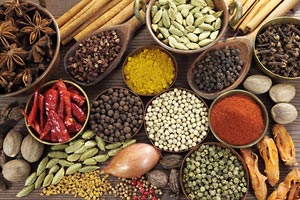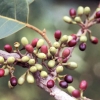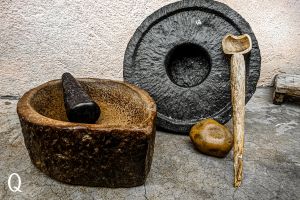7 Wonder Spices For A Healthier Life
 If you are looking for alternative ways to improve your health and have already started to change your lifestyle, you might like to consider including more spices in your diet too.
If you are looking for alternative ways to improve your health and have already started to change your lifestyle, you might like to consider including more spices in your diet too.
Most spices offer tremendous health benefits, and to enjoy them you’re not limited to eating them in red-hot spicy curries either!
Spices come from the barks, stems and seeds of plants and have been used for thousands of years to flavor foods and treat illnesses. Since records began spices were highly prized and often worth their weight in gold! Thousands of sailors died trying to find a route to India, until Portuguese navigator, Vasco Da Gama, found a way in 1498 and discovered the source of many of the valuable spices we still use today.
Alkalizing foods have a tonic effect on the body, and all spices are alkalizing. By neutralizing the acidity in the bloodstream, alkaline foods act as a ‘breath of fresh air’ to the system regenerating and restoring damaged cells. Diets high in acidic foods cause the body to break down prematurely, the bloodstream carries these ‘acid bombs’ throughout the system wreaking havoc in their wake. Spicy foods also increase the cognitive functions of your brain.
There are many spices to choose from, and most people are familiar with the popular ones such as basil, black pepper, clove buds, coriander and garlic. Here are some spices that offer outstanding health benefits that you may not be using as regularly;-
- Cayenne Pepper – This is known as a spice with a real zing to it. Many hot, spicy dishes contain cayenne pepper, so some tame tastebuds shy away from it. But you should embrace it because it’s known to increase your fat burning metabolism and can help shed 25% more pounds.
- Cinnamon – An excellent spice to help settle upset stomachs and diarrhea attacks. Cinnamon helps boost your metabolism, which is why many people recommend sprinkling it on your oatmeal to help you stoke up your body’s calorie-burning furnace for the day. It is also a brain activity booster, and simply smelling it enhances cognitive function and lifts the mood. As well as adding it to food, it is available as a supplement.
- Cumin – Rich in iron, this spice gives a distinctive warm flavour to an enormous range of savoury dishes, including curry. Cumin seeds taste slightly bitter, sharp and warm, and their pungent flavour persists for some time so they are generally dry roasted before use to bring out their flavour. In India, cumin seeds are used as a remedy for diarrhea, flatulence and as an aid to indigestion. A recent study has shown that cumin seeds may also have anti-carcinogenic properties.
- Ginger – Well known for its ability to help people with indigestion, nausea and to help with acid reflux. It’s also good for helping women through the days of morning sickness during pregnancy and for the dreaded motion sickness that some sailors and cruise-ship travelers suffer from. Ginger contains zingerone, which defends the neurons of the brain to improve memory. Research in 2011 suggests that ginger may also help ease migraines.
- Mustard – Seeds of mustard plants have been used for thousands of years for their pungent flavour in condiments, spicy greens for side dishes and salads, and in traditional folk medicine and Chinese herbal medicine to treat a variety of ailments. Mustard seeds contain many healing properties and have been used for centuries by Chinese herbalists to treat abscesses, bronchitis, colds, rheumatism, toothache, ulcers, and stomach disorders. They are an excellent source of monounsaturated fats, phosphorous, and a good source of iron, calcium, zinc, magnesium, and manganese.
- Nutmeg – The taste of nutmeg is sweet, warm, and highly aromatic. In Europe it has been used extensively in both sweet and savoury dishes, and it is a standard seasoning in many Thai recipes. Since ancient times the Indians and Arabs have valued nutmeg as a treatment for digestive, liver and skin complaints, and was also held to be an aphrodisiac. Nutmeg contains a natural organic compound called myristicin, which is known to shield your brain against degenerative disease such as Alzheimer’s.
- Turmeric – This spice smells peppery and fresh, with a hint of ginger and orange. It tastes pungent, bitter and musky and is an important ingredient in curry and Thai dishes. A compound in turmeric known as curcumin is a powerful anti-inflammatory and antioxidant that defends against free radicals. In paste form it is applied as a beauty mask, and like nutmeg, turmeric is known to improve your memory and help protect against Alzheimer’s.
Spices are most commonly used to liven up our food dishes, but what most don’t realize is that certain spices can actually help you lead a healthier life whilst making your food taste good. So the next time you’re planning your dinner menu, think to yourself, ‘What could I be doing for my health when I include spices in our favorite recipes tonight?’
Copyright © Quinessence Aromatherapy Ltd 2014. Written by Geoff Lyth

































